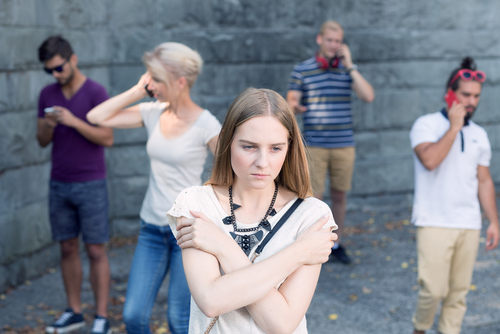Social anxiety disorder (SAD), also known as social phobia, is listed in the Diagnostic and Statistical Manual of Mental Disorders, Fifth Edition (DSM-5) as a chronic mental health condition. The National Institute of Mental Health (NIH) explains that social anxiety disorder is “characterized by persistent fear of one or more social or performance situations in which the person is exposed to unfamiliar people or to possible scrutiny by others.” The exact cause for developing an anxiety disorder remains unknown. Research suggests that it is likely due to a combination of contributing factors such as psychological, environmental, genetic, and developmental factors.
Signs and Symptoms
Every individual is unique and will have his or her own set of challenges with regards to social anxiety. Anxiety is a normal and healthy reaction to stress.
While fleeting anxiety is unavoidable for the vast majority of humans, an individual with social anxiety disorder will experience symptoms that interfere with his or her ability to function in his or her daily life. Common examples of signs and symptoms that an individual with SAD may exhibit could include any combination of the following, as provided by the Mayo Clinic:
- Muscle tension
- Agitation
- Fast heartbeat
- Excessive worry and or fear
- Sweating
- Irritability
- Shaking
- Poor eye contact with others
- Low self-esteem/ low self-worth
- Blushing
- Sadness
- Crying
- Nausea
- Dizziness or lightheadedness
In addition to the above, people with social anxiety disorder may have frequent self-deprecating thoughts and/ or constant thoughts of inadequacy. It is important to note that social anxiety disorder symptoms can change over time.
DSM-5 Diagnostic Criteria
The diagnosis process for social anxiety disorder typically includes several components such as a physical exam, reviewing one’s symptoms, completing a self-report questionnaire, and meeting the diagnostic criteria provided in the DSM-5. The diagnostic criteria outlined in the DSM-5 for social anxiety disorder include:
- Persistent, intense fear or anxiety about specific social situations due to fear of possibly being judged, embarrassed or humiliated
- Avoidance of anxiety-producing social situations or enduring them with intense fear or anxiety
- Excessive anxiety that is out of proportion to the situation
- Anxiety or distress that interferes with one’s daily living
- Fear or anxiety that is not better explained by a medical condition, medication or substance abuse
In order to ensure proper treatment, it is imperative to be thoroughly evaluated and diagnosed by a qualified mental health professional.
Treatment
There are many treatment options for SAD. Every person is different and will require a customized treatment plan, as each will respond distinctly to various treatment options. Treatment plans for social anxiety disorder will typically consist of a variety of therapeutic approaches, such as talk therapy, cognitive behavioral therapy (CBT), expressive arts therapy and dialectical behavior therapy (DBT). It is not uncommon for medication to be incorporated in one’s treatment plan in conjunction with psychotherapy. There are several different types of SSRIs that are often prescribed for individuals with SAD. SSRIs are Selective Serotonin Reuptake Inhibitors. Some of the common SSRIs that are often prescribed for social anxiety disorder include Lexapro (escitalopram oxalate), Zoloft (sertraline), and Prozac (fluoxetine). If left untreated, social anxiety disorder can lead to a plethora of short and long-term effects.
Disclaimer:
The information above is provided for the use of informational purposes only. The above content is not to be substituted for professional advice, diagnosis, or treatment, as in no way is it intended as an attempt to practice medicine, give specific medical advice, including, without limitation, advice concerning the topic of mental health. As such, please do not use any material provided above as a means to disregard professional advice or delay seeking treatment.




